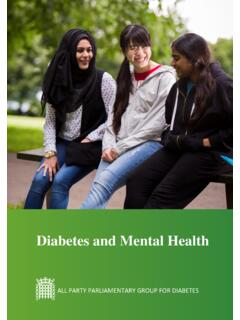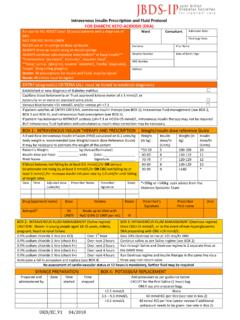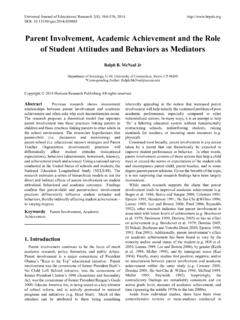Transcription of Understanding diabetes Your key to better health
1 1 Understanding diabetes your key to better health How this booklet can help you This booklet aims to help you if you: have just been diagnosed with diabetes are already living with diabetes and want to find out more about it are a parent, carer or friend of someone who has diabetes , or are interested in diabetes and would like to find out more. The booklet will tell you about: diabetes , its symptoms and associated health problems ( diabetes complications) what causes diabetes and who is most at risk how diabetes can be treated, and how you can help yourself to stay healthy. It also explains how diabetes UK can give you up-to-date information and support, on all aspects of living with diabetes . The good news about diabetes is that treatments are very effective and the more you know about your condition, the more you can to help yourself stay healthy to lead the sort of life you want to live, and to avoid the health problems associated with diabetes in later life.
2 Important The information in this booklet should be used together with the personal advice you have received from your doctor or diabetes nurse. You will be encouraged to learn to make changes to treatment yourself, but if you are not sure what to do, talk to your doctor or diabetes nurse. 2 What is diabetes ? diabetes describes a condition in which the body cannot make proper use of carbohydrate in food because the pancreas does not make enough insulin, or the insulin produced is ineffective, or a combination of both. Insulin is the hormone that helps glucose (sugar) from the digestion of carbohydrate in food, move into the body s cells where it is used for energy. When insulin is not present or is ineffective, glucose builds up in the blood.
3 This is because insulin is the key, which unlocks the door to the body s cells. Once the door is unlocked glucose can enter where it is used as fuel for energy so we can work, play and generally live our lives. If there is no insulin present in the body, as in Type 1 diabetes , then there is no key to unlock the door and the glucose stays in the blood. When there is not enough insulin, the cell doors are only partially unlocked, or when there is lots of insulin but the lock doesn t work properly (sometimes referred to as insulin resistance), this is Type 2 diabetes . Because the excess glucose stays in the blood and isn t being used as fuel for energy, people with untreated diabetes often feel very tired, pass large amounts of urine and are extremely thirsty.
4 As people with diabetes have problems with their insulin, it is necessary for them to take steps to either create insulin or to help the insulin they are making, work better . This can be done through a healthy lifestyle and treatment. By following a treatment plan, which includes healthy diet and regular physical activity, people with diabetes can control the amount of glucose in the blood and lead a healthy life. 3 What are the symptoms of diabetes ? The main symptoms of diabetes are: increased thirst going to the loo all the time especially at night extreme tiredness unexplained weight loss genital itching or regular episodes of thrush blurred vision slow healing of cuts and wounds. Type 2 diabetes develops slowly over a period of years.
5 Some people may not notice any symptoms at all and their diabetes is only picked up in a routine medical check up. Some people may put the symptoms down to getting older' or 'overwork'. Type 1 diabetes develops much more quickly, usually over a few weeks. In both types of diabetes , the symptoms are quickly relieved once it treated. Early treatment will also reduce the chances of developing the serious diabetes complications. 4 Who gets diabetes and what causes it? diabetes is a common health condition. About million people in the UK are known to have diabetes . And for every person who knows that they have the condition, there is probably another person with diabetes who does not yet know. Over three-quarters of people with diabetes have Type 2 diabetes .
6 Although the condition can occur at any age, it is rare in infants and becomes more common as people get older. Type 1 diabetes Type 1 diabetes develops when the insulin-producing cells in the pancreas have been destroyed. nobody knows for sure why these cells have been damaged but the most likely cause is the body having an abnormal reaction to the cells. This may be triggered by a viral or other infection. Type 1 diabetes used to be known as insulin dependent diabetes (IDD). People who develop diabetes under the age of 40 and especially in childhood, usually have this type of diabetes , however it can happen at any age. Type 2 diabetes Type 2 diabetes usually appears in middle-aged or older people, although more frequently it is being diagnosed in younger overweight people and is known to affect African-Carribean and South Asian people at a younger age.
7 The main cause is that the insulin that the body produces doesn t work properly (insulin resistance). Some people wrongly describe Type 2 diabetes as 'mild' diabetes . There is no such thing as mild diabetes . All diabetes should be taken seriously and treated properly . Type 2 diabetes used to be known as non insulin dependent diabetes (NIDD). The people most at risk of Type 2 diabetes : are white people aged over 40 years and people from African-Caribbean, Asian and minority ethnic groups aged over 25 who o have a family history of diabetes o are overweight o have high blood pressure, heart disease or have had a heart attack have had a borderline high blood glucose test are women with polycystic ovary syndrome who are overweight are women who have had high blood glucose levels during pregnancy (gestational diabetes ).
8 5 Other causes of diabetes There are some other causes of diabetes , including certain diseases of the pancreas, but they are all very rare.. and some things that do not cause diabetes : eating sweets or sugar does not cause diabetes stress does not cause diabetes although it may make the symptoms worse in people who already have the condition sometimes an accident or an illness may reveal diabetes if it is already there, but they do not cause it. You cannot catch diabetes from somebody, nor can you give it to anyone. 6 Help yourself to stay healthy If you have diabetes , you may need to make some changes to your way of life. However, by sticking to your management plan, monitoring your condition and following a healthy lifestyle, you should be able to continue your normal, day-to-day life and take part in the activities you have always enjoyed.
9 The long-term benefits of healthy eating and regular physical activity outweigh the excuses we can all make not to follow a healthy lifestyle. A positive attitude, careful planning and support from your family, friends and diabetes team all help. Healthy eating What you eat directly affects your blood glucose levels. It can also affect the amount of fat, such as cholesterol in your blood. By choosing healthy foods and being active you will help manage your blood glucose levels and your weight. The diet for people with diabetes is not a special diet. It is the normal healthy diet recommended for everybody low in fat, sugar and salt, with plenty of fruit, vegetables and starchy foods. Healthy eating is good for everybody, so there is no need to prepare separate meals for you and your family.
10 You do not need to buy special foods either, so relax, and learn how to enjoy a varied balanced diet. When you are first diagnosed with diabetes , your doctor should arrange for you to see a state registered dietitian who will give you individual dietary advice and discuss, if necessary, how to adapt your meals to make them healthier. In the meantime here is some information to get you started. 1. Eat regular meals based on starchy foods such as bread, pasta, chapatis, potatoes, rice and cereals. This will help to control your blood glucose levels. All varieties are fine, but try to include more of the wholegrain ones. 2. Try to cut down on the fat you eat as this will help you to lose weight, which will help you to control your diabetes . Eat less saturated (animal) fats in particular as this type of fat is linked to heart disease.















